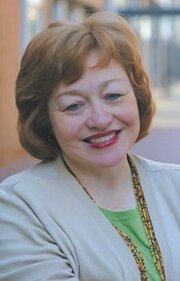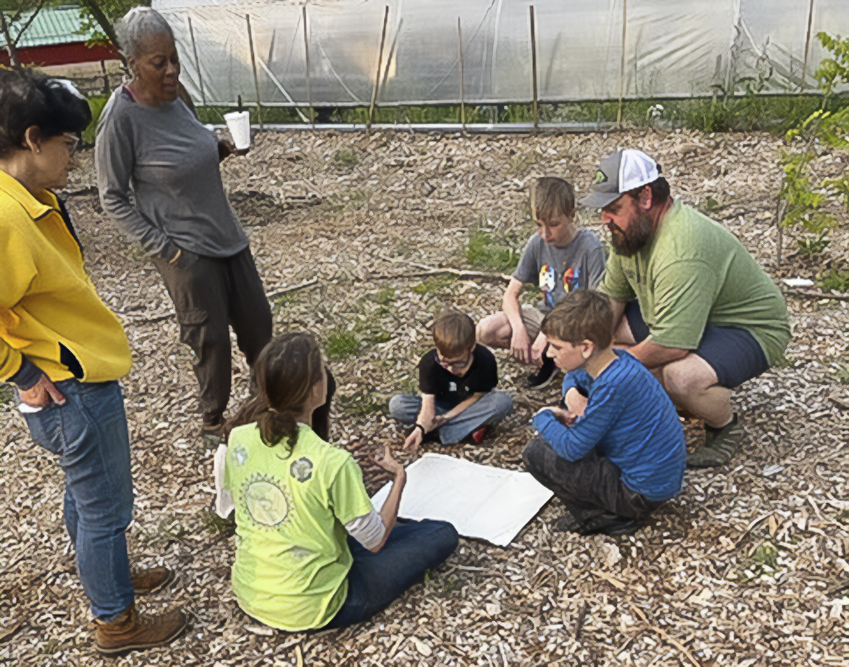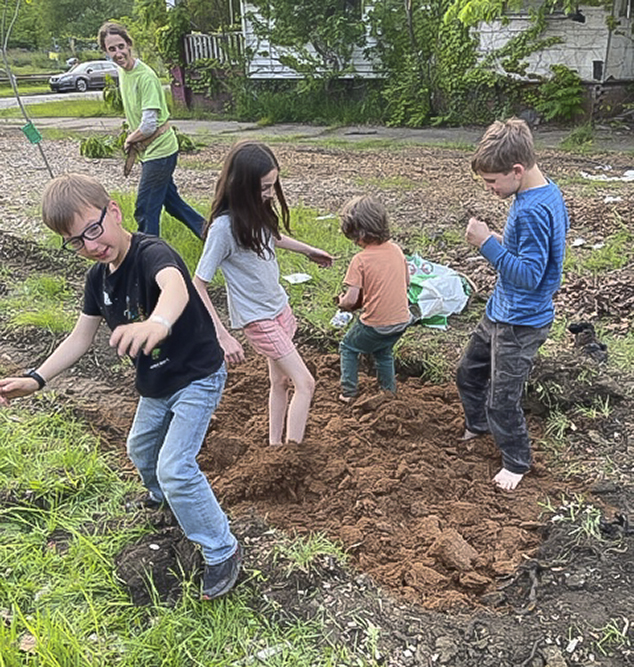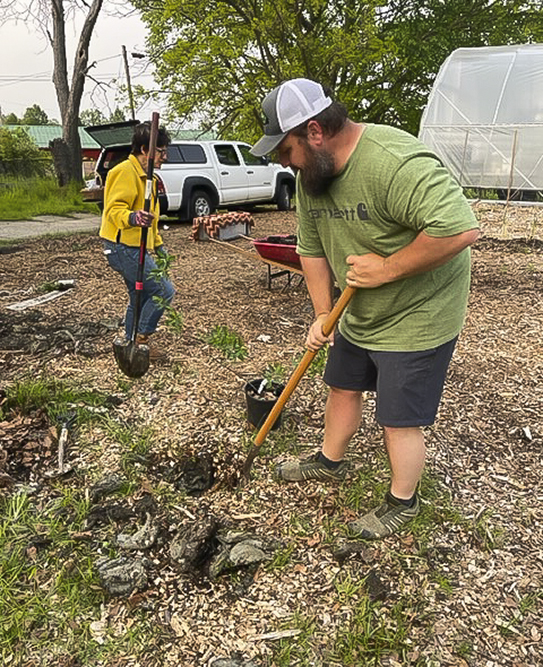Rooted in nature: Cuyahoga Arts & Culture grants nurture opportunities for new growth.
As the growing season gets underway in Northeast Ohio, area arts and culture organizations are developing new ways to foster a love for growing their own food right in their own back yards.
In its latest round of 2023 Project Support Grants, Cuyahoga Arts & Culture (CAC) officials note a number of gardening and foraging projects popping up.
“We are excited to see the many different ways these projects are getting people out into their communities and thinking about their food sources,” says CAC executive director Jill Paulsen. “Nature and science are important parts of arts and culture in Cuyahoga County, and these projects are just a few examples of all the interesting things happening outside this year with funding from CAC.”
FreshWater looks at five grant recipients who are making a difference with seeds, growing, and cultivation programs.
 East Cleveland Farmers Market -Learning Forest Project Food Forest ClassA garden of learning
East Cleveland Farmers Market -Learning Forest Project Food Forest ClassA garden of learning
The iconic Coit Road Farmers Market has a long history of providing shoppers with fresh produce and food, long before the farm-to-table concept became a social movement.
This growing season, the 91-year-old nonprofit market has expanded its reach to create an edible landscape through the Coit Community Learning Forest project.
Located on two city lots adjacent to the market, the Coit Community Learning Forest project is well on the way to becoming a garden where children and adults will learn about natural sciences that include ecology, traditional plant uses, and the art of landscape design. Plans call for it to be filled with native plants, as well as perennial food-producing ones.
To Joe Jerdonek, president of The East Cleveland Farmers Market Preservation Society—the nonprofit board that operates the market—the Learning Forest project represents an idea long overdue.
“Through the years, we’ve talked about the possibility of creating a garden filled with trees at the market, but it’s located on asphalt, and we needed land without asphalt,” explains Jerdonek. “The Cuyahoga Soil & Water Conservation District invited us to create a garden filled with trees on property where vacant homes had been demolished in 2020, and the City of East Cleveland gave us an easement for a second lot next door.”
A $2,512 CAC project support grant will provide plants that visitors to the garden can sample —including native passion fruit, American hazelnut, and lovage—and ensure continuing education classes won’t be interrupted.
“Studies have shown that urban gardens foster a sense of community and increase the feeling of safety within a neighborhood,” says Cleveland Heights resident Amit Shuck, an urban permaculturist who is spearheading Learning Forest’s design. “We’ll be teaching people how to plant trees from seed and clone them. It will be a place they can tour and use as inspiration to start their own backyard urban gardens.”
Sherwick Tree Stewards Program pruning LabSave our tree canopy
Since it was founded in 2006, the Western Reserve Land Conservancy (WRLC) in Moreland Hills has stayed true to its mission of land conservation and restoration.
It’s an undertaking that has included conserving 70,000 acres and creating 200 parks throughout 26 counties.
“Our vision is to establish thriving, prosperous neighborhoods nourished by vibrant natural lands, working farms, and healthy cities,” says WRLC development officer Ellen Matlock.
The nonprofit’s dedication to ensuring everyone has access to these assets has continued with the Sherwick Tree Stewards Training Program. Launched in 2015, it sponsors workshops and training sessions to provide more than 300 Greater Cleveland residents with the expertise they need to plant and nurture trees in their communities.
“Cleveland used to be known as The Forest City,” Matlock explains. “But due to development trends, lack of maintenance, and disease, our urban forest canopy has fallen to 18%. Some cities within Cuyahoga County have really invested in the care that’s needed for trees to grow. Others haven’t.”
Matlock adds that diminished tree canopies in urban areas often magnify existing racial and economic disparities.
A component of the Sherwick program is designed to remedy that inequity. Through WRLC’s Reforest Our City initiative, classes and hands-on workshops teach residents in urban neighborhoods tree planting and care techniques, as well as promote ways they can bond as a community to protect the urban forest they’re creating. A $4,000 CAC grant has helped strengthen that effort.
To date, volunteers and activists living in five priority Cleveland neighborhoods—Slavic Village, Mount Pleasant, Buckeye-Shaker, Detroit Shoreway and Cudell—have committed to tending more than 15,000 robust-sized saplings WRLC has distributed and have promised the trees will receive the love and care they need to grow.
“Trees are beneficial in so many ways,” says Matlock. “They filter air particulates and remove pollutants that can trigger asthma and COPD, cut down on noise, and lead to less stress, and [promoted] community pride.
“Every tree planted,” she adds, “is one more step to creating a sustainable, livable and climate-resilient city.”
Cleveland Seed Bank Annual Winter Seed Swap 2023Planting the future
To Chris Kennedy, co-founder of the Cleveland Seed Bank (CSB), the non-profit’s guiding principle is straightforward and succinct: “It takes one seed to create a forest, and it can take one freely shared packet of seeds to spark a change to become a grower and steward of the earth.”
Since 2013, CSB’s Sowing Seeds of Community Resilience project hosts 90 free community events—including a celebration of National Seed Swap Day on the last Saturday in January that draws more than 500 seed savers each year.
The initiative has also led to the distribution of more than 50,000 organic seed packets to 30 libraries, including those in the Cleveland Public Library and Cuyahoga County Public Library systems. The libraries in turn offer free seeds to patrons.
“Seven of our 10 seed libraries are in food deserts where people don’t have easy access to fresh fruits and vegetables,” Kennedy says. “CSB’s heart lies in making sure everyone has access to high-quality seeds so they can grow their own healthy food, and we teach them how to do it. If you grow 10 tomato plants, for example, and save the seeds from them, you’ll have enough to grow plants for the rest of your life.”
In other Cuyahoga County communities, seed libraries have served as springboards to the formation of seed savers groups dedicated to preserving the genetic biodiversity of plants.
A $4,000 CAC grant helps CSB’s Sowing Seeds of Community Resilience project thrive by providing financial resources for additional educational workshops, seed packets, and special events.
“Seed saving is an ancient tradition that stretches back 12,000 years,” explains Kennedy. “But over the last century, this once fundamental part of the human experience has largely disappeared. Preserving agricultural biodiversity in the form of seeds allows us to adapt to a changing climate.”
Kennedy emphasizes the proactive nature of the program. “If we can encourage people to be just a little more active in thinking about where their food comes from and practice organic methods,” he says, “it will lead to community engagement that can result in discovering small-scale solutions to the problems we face today.”
Kulture Kids Garden at Andrew J. Rickoff SchoolA little bit of everything
Students, staff, and teachers at Andrew J. Rickoff Elementary School in Cleveland’s Mount Pleasant neighborhood have a rich tradition of making history come alive.
Since 2010, Cleveland Heights nonprofit Kulture Kids has created original, interactive arts programs and performances designed to inspire a sense of community, cultural awareness and lifelong learning.
Storytelling, dance, theater, music, literature, and visual art activities complement Ohio’s Learning Standards’ science, social studies, language arts and math curriculum.
In 2016, students and staff developed A Pleasant Garden to support the Cleveland Metropolitan School District’s Comprehensive Wellness Policy of promoting good nutrition and physical activity.
Students grow produce that was available free of charge to the community and created “A Pleasant Cookbook” filled with favorite recipes and health and wellness tips.
“The garden provides students with opportunities for learning about, and connecting to, the environment,” says Kulture Kids executive director Katherine Hermann. “It’s a wonderful way to teach students how we can nourish our bodies with things that are grown in the ground.”
This year, the garden serves as a centerpiece for hands-on learning in new ways: It’s evolved into the “From Ancient Times to A. J. Today,” greenspace, where students in pre-K through fifth grade experience the culture of ancient Egypt.
Programming in the garden features workshops where they learn about hieroglyphics, practice kemetic yoga, make music through African drumming—and continue to grow flowers, herbs and vegetables for their families and neighbors. A $17,272 CAC grant ensures A Pleasant Garden continues to flourish.
“The study of ancient cultures is part of Ohio’s standards-based curriculum,” explains Hermann. “And Egypt is a subject that lives on in our popular imagination. The garden helps students learn about how their lives relate to a variety of cultures, and the art forms that are part of it.”
Hermann says A Pleasant Garden is just the right recipe for exposing students to a well-rounded curriculum and presenting many options.
“Not every student is going to be a visual artist, but maybe a handful will be,” he says. “Not every student is going to be a yoga practitioner, but some could be. If we can expose them to a little bit of everything, they’ll discover choices and opportunities they never knew existed.”
Celebrate Arts and Performance work swith arts and gardening camp studentsA hub for art
The Celebrate the Arts Performance Academy (C.A.P.) at Shore Cultural Centre in Euclid encourages every student to empower artistic expression in forms they’re passionate about—from culinary arts, to music and theater, to dance and literary arts.
“The cultural center is a hub for art,” says C.A.P. executive director Andrea Jackson, who’s also a licensed high school science teacher and gerontologist. “And our curriculum is designed to offer unparalleled, multidisciplinary arts education that incorporates literacy, math, science and history instruction into each class.”
A $5,000 CAC grant is supporting that mission from beginning to completion. Elementary school students who enroll in a special C.A.P. summer camp will break ground on, plan, and plant a community botanical garden at the arts center.
The centerpiece will be a mural celebrating the City of Euclid that Cleveland artist Jerome White will help students design. High schoolers who take part in the Youth Opportunities Unlimited workforce development program will be on hand to provide paid assistance. When the project is completed, participants will stage a celebratory production featuring a variety of artistic genres.
“We reached out to students who have a passion for the arts,” says Jackson. “They might be visually inclined to draw and paint, but they may also love dance. The city of Euclid helped us find kids who have an interest in construction to assist with building garden beds and signage.”
Jackson adds that while they’re having fun from an arts aspect, participants will also be sharpening their academic skills as they learn about the science behind growing plants and the mathematical acumen necessary to create precise design diagrams.
“They may not feel it or see it,” she says with a smile, “but they are.”
“The project will not only consist of quality instruction but offer a therapeutic place that kids will respect because they’re part of it,” Jackson continues. “There’ll also be opportunities for positive mentorship and etiquette training as we teach everyone involved how to reflect their best selves.”




